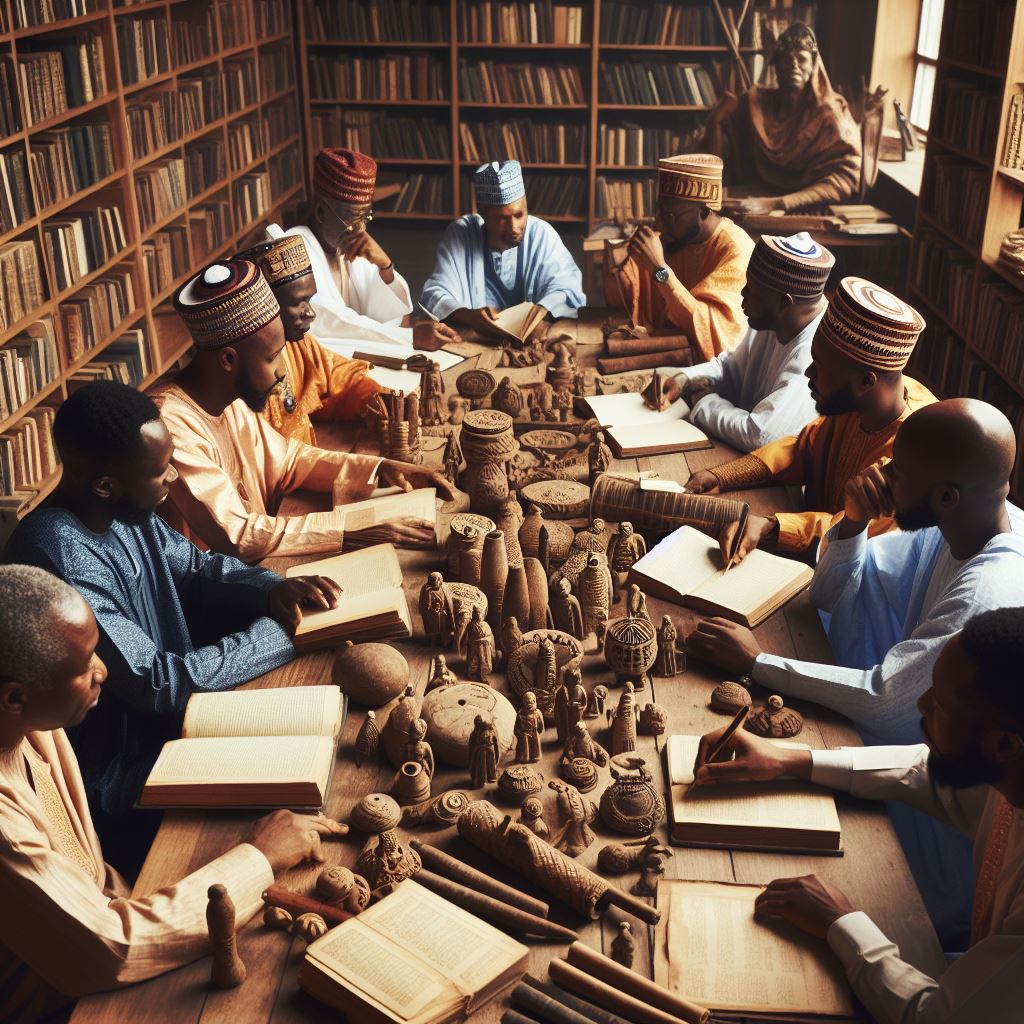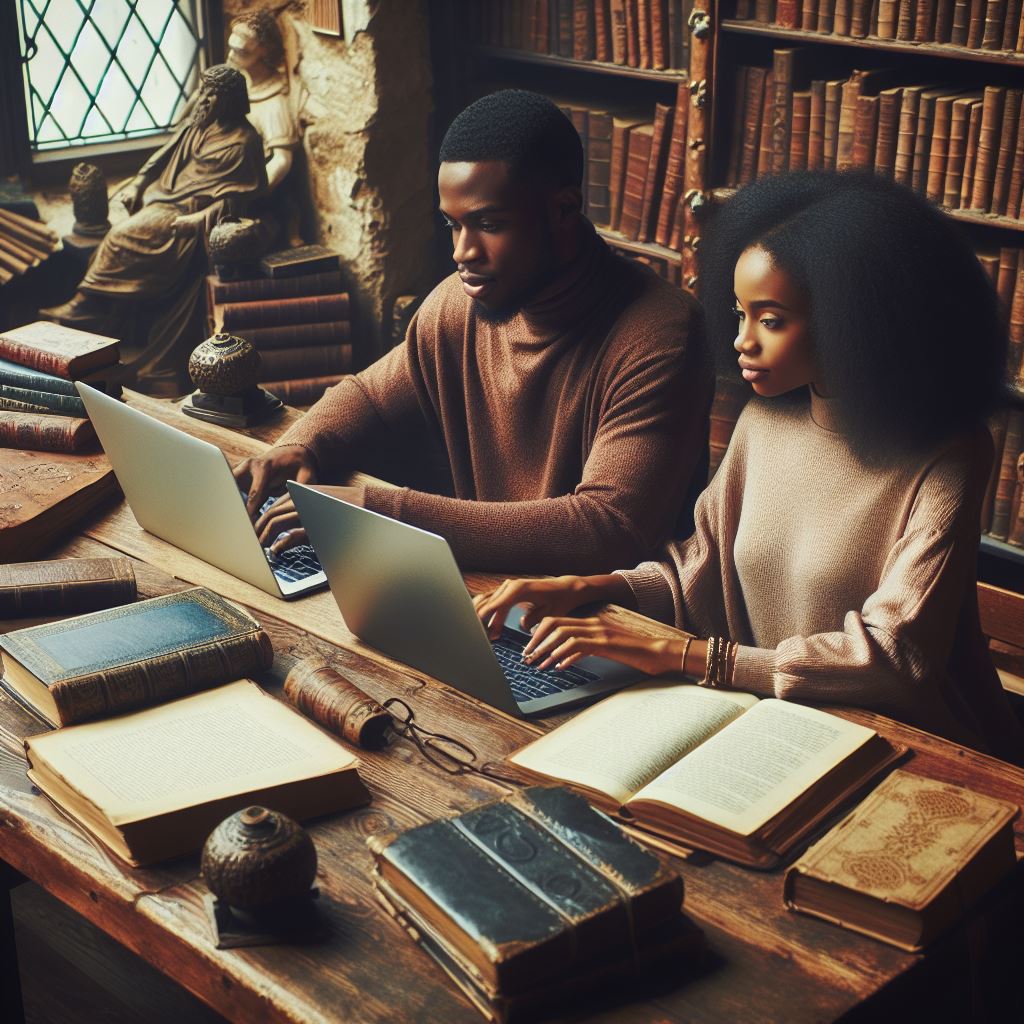Introduction
Art and literature play a crucial role in African and Asian studies by providing insights into the cultural, social, and historical contexts of these regions.
Through artistic expressions and literary works, we are able to understand the traditions, beliefs, and experiences of diverse communities.
Additionally, art and literature serve as a powerful medium for storytelling and representation, helping to showcase the rich and complex narratives of Africa and Asia.
They contribute to the preservation of cultural heritage and promote cross-cultural understanding and appreciation.
Furthermore, by studying art and literature from African and Asian perspectives, we are able to challenge dominant narratives and foster critical thinking about global issues such as colonialism, identity, and social justice.
In closing, art and literature continue to be relevant and significant in African and Asian studies as they provide valuable insights, promote cultural exchange, and contribute to a more nuanced understanding of the world we live in.
Importance of field trips
How Field Trips Provide Students with a Unique Opportunity to Immerse Themselves in a Different Cultural Environment
Field trips provide students with unique opportunities to immerse themselves in different cultural environments.
This immersion goes beyond what textbooks can offer.
When students visit African and Asian regions, they experience the culture firsthand.
They see, hear, and feel the local customs, traditions, and daily life.
This direct exposure is invaluable.
Students can interact with local people, taste traditional foods, and participate in cultural activities.
Such experiences deepen their understanding of the region’s cultural nuances.
This immersion fosters a genuine connection to the place and its people.
It transforms abstract concepts into lived experiences.
How Field Trips Can Help Students Connect Theoretical Knowledge Gained in the Classroom with Real-World Experiences
Field trips bridge the gap between theoretical knowledge and real-world experiences.
In the classroom, students learn about historical events, social structures, and cultural practices.
On field trips, they see these elements in action.
Visiting historical sites helps students visualize past events and understand their significance.
For example, seeing ancient temples in Asia or colonial landmarks in Africa makes history tangible.
Students can better grasp the context and impact of these sites.
Field trips also allow students to observe social structures and cultural practices directly.
They can see how cultural traditions are maintained and adapted in modern times.
This direct observation enhances their understanding of classroom theories.
It encourages students to think critically about the material they study.
They can ask questions, seek explanations, and engage more deeply with the subject matter.
This practical application of theoretical knowledge enriches their learning experience.
The Impact of Field Trips in Fostering Cross-Cultural Understanding and Empathy
Field trips play a crucial role in fostering cross-cultural understanding and empathy.
Immersing in a different culture helps students appreciate its uniqueness and complexities.
This appreciation fosters respect and empathy for people from different backgrounds.
Students learn to see the world from diverse perspectives.
This exposure challenges stereotypes and preconceived notions.
Interacting with local communities humanizes distant cultures, breaking down barriers of misunderstanding.
Students hear personal stories and experiences, which are powerful tools for building empathy.
They realize that despite cultural differences, common human experiences bind us together.
Field trips also promote intercultural dialogue. Students engage in conversations with locals, asking questions and sharing their perspectives.
This exchange fosters mutual understanding and respect. It helps students develop a global mindset, essential in today’s interconnected world.
Moreover, these experiences have a lasting impact.
Students carry the lessons learned on field trips throughout their lives.
They become more open-minded, empathetic, and culturally aware individuals.
This personal growth benefits them in their academic, professional, and personal lives.
Read: Exploring Semiotics in Communication Arts
Planning and preparation
- Outline the steps involved in planning a successful field trip, including obtaining necessary permits and permissions.
- The importance of conducting research on the destination to ensure a meaningful learning experience for students.
- The significance of having a clear itinerary and safety measures in place during the field trip.
Step 1: Research and preparation
Before embarking on a field trip, it is crucial to conduct thorough research on the destination.
This includes gathering information on the cultural significance, historical background, and geographical features of the area.
By doing so, educators can tailor the itinerary to align with the learning objectives of the trip.
Step 2: Obtain necessary permits and permissions
Depending on the destination and nature of the field trip, it may be required to obtain permits and permissions from local authorities.
This step is essential to ensure a smooth and hassle-free experience for both educators and students.
Step 3: Create a detailed itinerary
A well-planned itinerary is essential for a successful field trip.
It should include a schedule of activities, visits to relevant sites, and opportunities for students to engage with local communities.
Having a clear plan in place helps maximize the learning outcomes of the trip.
Step 4: Implement safety measures
Ensuring the safety of students is paramount during any field trip.
Educators should establish safety protocols, provide students with necessary information, and designate responsible adults to oversee the group.
Emergency contacts and first aid supplies should also be readily available.
Step 5: Engage with local experts
Connecting with local experts, historians, or guides can enrich the learning experience for students.
These individuals can provide valuable insights, share personal stories, and offer unique perspectives that can deepen students’ understanding of the destination.
By engaging with locals, students can gain a more authentic and immersive experience.
Step 6: Reflect and debrief
After the field trip, it is important to reflect on the experience and debrief with students.
Encourage them to share their thoughts, insights, and reflections on what they learned during the trip.
This reflection process helps reinforce key concepts, solidify learning outcomes, and allows students to make connections between theory and real-world experiences.
Read: Developing Critical Thinking in Language Arts
Selection of destinations
Examples of Suitable Destinations for Field Trips in African and Asian Studies
Selecting suitable destinations is crucial for impactful field trips in African and Asian Studies.
Historical sites, museums, and cultural festivals offer rich learning experiences.
In Africa, students might visit Egypt’s pyramids, exploring ancient history and architecture.
South Africa’s Robben Island, where Nelson Mandela was imprisoned, provides insights into the struggle against apartheid.
In Asia, the Great Wall of China offers a glimpse into ancient engineering and military history.
Japan’s Hiroshima Peace Memorial Park teaches lessons about war, peace, and resilience.
Cultural festivals like India’s Diwali or Thailand’s Songkran allow students to experience living traditions and community celebrations firsthand.
Museums also provide valuable educational experiences.
The Apartheid Museum in Johannesburg and the National Museum of China in Beijing showcase cultural and historical artifacts, offering deep insights into each region’s past and present.
The Criteria for Selecting Destinations, Including Relevance to the Curriculum and Accessibility for Students
Selecting destinations requires careful consideration to ensure relevance and accessibility.
Destinations must align with the curriculum, enhancing what students learn in the classroom.
For instance, if the curriculum covers colonial history, visiting former colonial sites in Africa or Asia can provide practical insights.
Accessibility is another critical factor. The destination should be reachable within the field trip’s time and budget constraints.
Safety is also paramount; destinations must be politically stable and safe for student travel.
Additionally, logistical aspects like accommodation, transportation, and local support must be feasible.
Educational value is a primary criterion. The site should offer learning opportunities that textbooks cannot provide.
It should stimulate students’ curiosity and encourage critical thinking.
For example, visiting a historical site allows students to visualize historical events, making the learning experience more tangible and memorable.
The Importance of Choosing Destinations that Offer Diverse Perspectives on African and Asian Cultures
Choosing destinations that offer diverse perspectives is vital. Africa and Asia are vast, with varied cultures, histories, and experiences.
Field trips should reflect this diversity, providing students with a comprehensive understanding.
For example, visiting urban centers like Nairobi and rural areas in Kenya can highlight contrasts and similarities within the same country.
Diverse destinations expose students to different social, economic, and political contexts.
This exposure helps them appreciate the complexity and richness of African and Asian societies.
It also challenges stereotypes and broadens their worldview. By experiencing multiple perspectives, students develop a nuanced understanding of cultural diversity and interconnectedness.
Incorporating visits to various cultural festivals is also beneficial.
Festivals often embody the heart of cultural traditions, values, and communal life.
Participating in or observing these events provides authentic cultural experiences, enhancing students’ empathy and cultural sensitivity.
Read: Student Experiences: Life in Communication Arts

Learn More: The Impact of Globalization on Nigerian Sociology
Gain More Insights: Overview of Criminology & Security Studies in Nigeria
Learning outcomes
- The potential learning outcomes of field trips, such as increased cultural awareness, critical thinking skills, and teamwork.
- How field trips can enhance students’ ability to analyze and interpret complex historical and cultural phenomena.
- Examples of assignments and reflections that can help students process and apply their learning from field trips.
Potential learning outcomes of field trips, such as increased cultural awareness, critical thinking skills, and teamwork
Increased Cultural Awareness
Field trips in African and Asian studies can expose students to diverse cultures, traditions, and customs first-hand.
By interacting with local communities, students can gain a deeper understanding of different ways of life, values, and beliefs.
This immersive experience helps students appreciate and respect cultural differences, fostering empathy and global citizenship.
Critical Thinking Skills
Field trips provide opportunities for students to observe, analyze, and question historical and cultural phenomena in real-world contexts.
By encountering new environments and perspectives, students are challenged to think critically about the complexities of societies, politics, and economies.
This hands-on approach encourages students to make connections, draw conclusions, and evaluate evidence, thus enhancing their analytical skills.
Teamwork
Collaborative activities during field trips promote teamwork and communication among students.
Working together to navigate unfamiliar surroundings, engage with local communities, and complete group assignments requires effective cooperation and coordination.
Through these shared experiences, students learn to appreciate diverse viewpoints, negotiate differences, and achieve common goals as a team.
Enhanced Ability to Analyze and Interpret Complex Phenomena
Field trips offer unique opportunities for students to explore the historical, cultural, and socio-economic factors shaping African and Asian societies.
By visiting historical sites, museums, and local communities, students can witness these phenomena firsthand, deepening their understanding of complex issues such as colonization, migration, globalization, and development.
Engaging with primary sources and local experts allows students to analyze diverse perspectives, challenge assumptions, and form nuanced interpretations of past and present realities.
Assignments and Reflections
Assignments following field trips can help students process and apply their learning effectively.
For example, students can be tasked with writing reflective journals, research papers, or group presentations that explore their experiences, insights, and observations during the trip.
These assignments encourage students to synthesize information, articulate their thoughts, and connect their fieldwork findings to broader theories and concepts.
Additionally, post-trip discussions, peer reviews, and feedback sessions provide opportunities for students to engage in dialogue, share perspectives, and receive constructive criticism, further deepening their learning and enhancing their academic growth.
In short, field trips and expeditions in African and Asian studies offer valuable opportunities for students to develop cultural awareness, critical thinking skills, and teamwork.
By immersing themselves in diverse environments, engaging with local communities, and analyzing complex phenomena firsthand, students can broaden their perspectives, enhance their academic skills, and cultivate a deeper appreciation for global diversity and interconnectedness.
Read: Communication Arts: Balancing Theory and Practice
See Related Content: Importance of African and Asian Studies in Nigeria
Challenges and Solutions
- Identify common challenges faced during field trips, such as language barriers, logistical issues, or cultural misunderstandings.
- Suggest strategies for overcoming challenges, such as hiring local guides, providing language support, or adapting the itinerary as needed.
- The importance of debriefing sessions after field trips to address any issues and reflect on the experience.
Common Challenges Faced During Field Trips
- Language Barriers: Communicating with locals in remote areas can be challenging.
- Logistical Issues: Transportation, accommodations, and meal arrangements can be problematic.
- Cultural Misunderstandings: Differences in customs, traditions, and etiquette may lead to misunderstandings.
Strategies for Overcoming Challenges
- Hiring Local Guides: Local guides can help bridge the language and cultural gaps.
- Providing Language Support: Translators or language apps can aid in communication.
- Adapting the Itinerary: Flexibility in the schedule can accommodate unexpected challenges.
Importance of Debriefing Sessions
After a field trip, debriefing sessions are essential for the following reasons:
- Addressing Issues: Any challenges faced during the trip can be discussed and resolved.
- Reflecting on the Experience: Participants can share their insights and learning moments.
- Improving Future Trips: Feedback from debriefing sessions can be used to enhance future expeditions.
Essentially, field trips and expeditions in African and Asian studies present unique challenges, but with careful planning, open communication, and debriefing sessions, these obstacles can be overcome, leading to enriching and educational experiences for all involved.
See Related Content: Mass Communication vs Journalism: Key Differences
Conclusion
Field trips and expeditions in African and Asian Studies offer unique, immersive learning experiences.
They provide invaluable insights into different cultures and histories.
These hands-on experiences bridge the gap between classroom knowledge and real-world understanding.
Visiting historical sites, museums, and cultural festivals enhances students’ academic growth and cultural appreciation.
Field trips foster empathy, challenge stereotypes, and encourage critical thinking.
They expose students to diverse perspectives, enriching their global awareness.
Such experiences are crucial for developing well-rounded, culturally sensitive individuals.
Educators and students should embrace the opportunities offered by field trips.
These journeys enhance the learning experience, making education more engaging and impactful.
By participating in field trips, students gain deeper, more meaningful insights into African and Asian cultures.
This active approach to learning is essential for fostering a comprehensive understanding of our diverse world.




